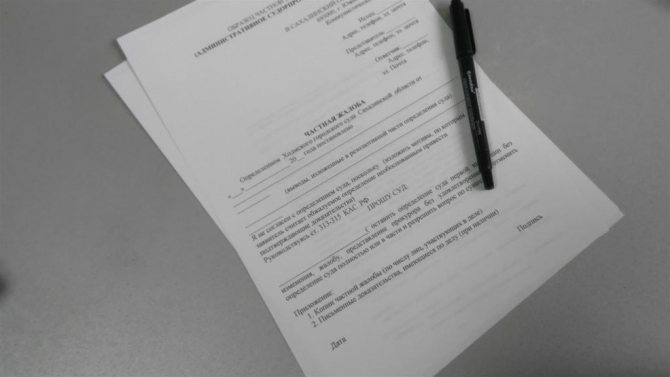Unfortunately, the bailiff service does not always execute court decisions as quickly, efficiently and lawfully as we would like - for various reasons. The balance of rights and interests of the debtor and the claimant may not be respected due to incorrect actions of the bailiff, including the adoption of an illegal resolution, act, etc.
There are several possibilities for appealing against the bailiff’s actions/inactions. You can file a complaint:
- in the order of subordination (i.e. to a higher bailiff),
- to the prosecutor's office or go to court (Article 19 of the Federal Law “On Bailiffs” No. 118-FZ of July 21, 1997).
What is a subordinate complaint?
A universal way, the fastest and most appropriate for expressing dissatisfaction with the current and organizational issues of the bailiff’s activities, when no serious violations have yet occurred and global consequences (such as causing damage, impossibility of further execution of the court decision) have not occurred. For example, the bailiff unreasonably delays in carrying out the enforcement action, and this can be corrected literally within a few days.This is a complaint to the immediate supervisor of the bailiff, a superior person.
You can complain about an ordinary bailiff to the senior bailiff of the department, about a senior bailiff - to the chief bailiff of a constituent entity of the Russian Federation, then - to the chief bailiff of the Russian Federation. (Article 123 of the Federal Law “On Enforcement Proceedings” No. 229-FZ of October 2, 2007).
How to properly file a complaint?
Such a complaint can be filed within 10 days after the bailiff committed an action that seems unlawful to you , or after an unlawful inaction was discovered. It should indicate all the data of both the bailiff and the person filing the complaint, describe what exactly seems wrong to you and why (it is advisable to refer to the law), indicate your requirements, i.e. What do you see as a possible way out of the situation: the bailiff performing an action, canceling the decision, etc. However, you can simply indicate a requirement to conduct an internal audit in relation to the specified actions of the bailiff.
Normative base
The main document on the basis of which a complaint against bailiffs is filed is Federal Law of October 2, 2007 No. 229-FZ “On Enforcement Proceedings” (Chapter 18, Articles 122-128).
We invite you to familiarize yourself with: Sample contract for work with an individual
The Code of Administrative Proceedings of the Russian Federation dated March 8, 2015 N 21-FZ, which discusses the deadlines for filing complaints and other legal norms, as well as the Civil Procedure Code of the Russian Federation dated November 14, 2002 No. 138-FZ, will be useful.
In addition, the activities of bailiffs are regulated by orders and regulations of the Ministry of Justice of Russia and the Bailiff Service of the Russian Federation.
Attention! Our qualified lawyers will assist you free of charge and around the clock on any issues. Find out more here.
Filing a complaint to the prosecutor's office
You can also write a complaint against the bailiff to the prosecutor's office.
The powers of the prosecutor's office include, among other things, control and supervision of bailiffs' compliance with the law. The prosecutor's office will check both the validity of the arguments set out in the complaint and the use by higher-ranking bailiffs of their powers to control the actions of the bailiffs.
It is assumed that initially the action on the complaint should be taken by a higher-ranking bailiff, therefore, if the above-described complaint in the order of subordination is not filed at all, then the prosecutor’s office will not consider it, but will forward it to a higher-ranking bailiff for consideration (Instruction of the Prosecutor General’s Office of Russia dated May 12, 2009 No. 3155/7) .
Sample application (complaint) for submission in order of subordination
When the debtor does not plan to execute a court decision or comply with the terms of another document, it is necessary to contact the SSP department at its location.
Guided by the levers provided by law, they carry out actions to restore the rights of the claimant.
Moreover, this may concern not only debt collection, but also eviction from an apartment, reinstatement at work, as well as the protection of other rights.
IN ___________________________
(name of the department if the complaint is sent in the order of subordination)
from ___________________________
(Applicant’s full name, address)
Interested party: ___________
(name, address
bailiff)
Debtor (collector): ____________
(Name of the second party, address)
STATEMENT
on challenging the actions of the bailiff

"_"______ ___G. By order of the bailiff, enforcement proceedings were initiated on the basis of a writ of execution (court order) to recover from _____ (full name of the debtor) in favor of _____ (full name of the collector) the sum of ____ rubles.
During the execution of enforcement actions, the bailiff performed the following actions ____ (indicate the actions (inactions) that are being appealed by the applicant).
I do not agree with these actions, since they violate my rights ____ (indicate what the violation of the applicant’s rights is).
In accordance with Article 121 of the Federal Law “On Enforcement Proceedings”, decisions of the bailiff, their actions (inaction) can be challenged by the claimant, debtor or persons whose rights and interests are violated by such decision, actions (inaction). An application to challenge the decisions of an official of the bailiff service, his actions (inaction) is filed in the order of subordination or to the court in the area of \u200b\u200bactivity of which the specified official performs his duties, within ten days from the date of the decision, commission of actions or from the day when the claimant , the debtor or persons whose rights and interests are violated by such a resolution, actions (inaction), became aware of the violation of their rights and interests.
Based on the above, guided by Articles 121, 123, 124, 127, 128 of the Federal Law “On Enforcement Proceedings”,
Recognize illegal actions of the bailiff _____ (list illegal actions (inactions), indicate details of the appealed decision). Oblige _____ (full name of the bailiff) to eliminate in full the violation of my rights.
Application:
- Copy of application
- A copy of the resolution to initiate enforcement proceedings
- Appealed decision (written response)
- Available documents confirming the arguments set out in the application
Signature, date.
On September 15, 2015, the Code of Administrative Proceedings of the Russian Federation (hereinafter referred to as the Code of Administrative Procedure of the Russian Federation) came into force, while subsection 3 of the Code of Civil Procedure of the Russian Federation - proceedings in cases arising from public legal relations - became invalid.
Based on the foregoing, when filing applications to challenge the actions of bailiffs, you need to pay attention to the features and requirements introduced by the CAS of the Russian Federation for the form and content of applications submitted to the court.
In addition, we draw your attention to the fact that the CAS of the Russian Federation has introduced new requirements for the registration of powers of the applicant’s representative. In addition, according to Art. 55 of the Code of Arbitration Code of the Russian Federation, representatives in court in administrative cases can be persons who have full legal capacity, are not under guardianship or trusteeship and have a higher legal education.
We suggest you read: Article for trespassing into private property
Moreover, when filing an administrative claim in court, along with documents certifying the status and powers of the representative, representatives must submit documents on their education.
To the Zasviyazhsky District Court of Ulyanovsk
432028, Ulyanovsk, 50th anniversary of the Komsomol Ave., 23B
Indicate the applicant's details, full name, registration address
Cont. telephone: ___________________
The Bailiffs Department and the details of the person whose actions (inaction) are being disputed are indicated
You can also indicate the FSSP Office as a co-defendant
ADMINISTRATIVE CLAIM STATEMENT
Name of the contested decision (action (inaction), body (official) that made this decision (performed this action (inaction), number, date of the decision (date and place of the contested action (inaction).
When challenging inaction, information about what it consists of is indicated (the body (a person vested with state or other public powers) avoids making any decisions or performing any actions in accordance with the duties assigned in accordance with the procedure established by law).
Other data regarding contested decisions, actions (inactions).
Information about the rights, freedoms and legitimate interests of the administrative plaintiff, which, in his opinion, are violated by the contested decision, action (inaction).
Regulatory legal acts and their provisions, for compliance with which contested decisions and actions (inactions) should be checked.
Information about whether a complaint was filed with a higher authority in the order of subordination or a person of higher authority in the order of subordination on the same subject specified in the submitted administrative statement of claim. If one was submitted, the date of its submission and the result of its consideration are indicated.
Information about the impossibility of attaching to the administrative statement of claim any documents specified in Part 1 of Art. 126 CAS RF, namely:
- notifications of delivery or other documents confirming delivery to other persons participating in the case, sent in accordance with Part 7 of Art. 125 CAS RF copies of the administrative statement of claim and documents attached to it, which they do not have;
- documents confirming the circumstances on which the administrative plaintiff bases his claims;
- powers of attorney or other documents certifying the powers of the representative of the administrative plaintiff, documents confirming that the representative has a higher legal education, if the administrative claim was filed by the representative;
- documents containing information about the complaint filed in the order of subordination and the results of its consideration, provided that such a complaint was filed.
Requirement to declare illegal a decision, action (inaction) of a body (official).
Application:
- Copies of the administrative statement of claim and documents attached to it according to the number of persons participating in the case (if there is no notice or other document confirming their delivery to these persons).
- Documents confirming the circumstances on which the administrative plaintiff bases his claims regarding the number of persons participating in the case (if there is no notice or other document confirming their delivery to these persons).
- A power of attorney or other document certifying the powers of the representative of the administrative plaintiff, a document confirming that the representative has a higher legal education, if the administrative claim was filed by the representative.
- Documents containing information about the complaint on the same subject as indicated in the submitted administrative statement of claim, filed in the order of subordination, and the results of its consideration, as well as a copy of the response, provided that it was considered.
We invite you to read: The court issued a ruling on the refusal of the court order
Signature
Filing a complaint to court
The decisions, actions and inactions of the bailiff can be appealed in court.
Consideration of a case in court is a longer and more complex process. Unlike the previous two ways to complain, a judicial appeal requires the applicant to participate much more actively: providing evidence, justifying his position, and attending court hearings. Therefore, it is more correct to go to court in case of serious violations that entail significant consequences. For example, if the claimant or debtor suffered damage due to the unlawful actions of the bailiff, then the court decision may provide for compensation for damage from the state budget. This cannot be done either by a decision of a higher bailiff or a prosecutor.
Complaints against bailiffs affecting interests and rights in the field of business activities; cases related to the execution of executive documents issued by arbitration courts, as well as some other cases in accordance with the Arbitration Procedure Code of the Russian Federation and the federal law “On Enforcement Proceedings,” are considered by arbitration courts (arbitration court of a constituent entity of the Russian Federation). All other categories of cases challenging the activities of bailiffs fall within the competence of courts of general jurisdiction (district court). The application is submitted to the court at the location of the bailiff, and is considered according to the rules of the relevant chapters of the Code of Civil Procedure of the Russian Federation or the Arbitration Procedure Code of the Russian Federation.
How does the procedure for challenging the actions of a bailiff take place?
According to the CAS of the Russian Federation, individuals and enterprises have the opportunity to file an appeal against the decision of the bailiff to the same extent as against other government officials.
Help for challenging are the following signs:
Dear readers! Our articles talk about typical ways to resolve legal issues with debts, but each case is unique. If you want to find out how to solve your particular problem, please use the online consultant form on the right or call . It's fast and free!
- Violation of rights or interference with freedom of action;
- There is no reason to claim the debt;
- Forcible imposition of obligation.
The victim can challenge the decision of the bailiffs in several instances:
- From a leading official;
- In judicial jurisdiction;
- At the prosecutor's office.
Important: if a person turns to the leadership of the FSSP for help, he retains the right to go to court, because, according to the Federal Law, his rights and interests have been violated. The number of complaints is not regulated.
The victim also has the opportunity to withdraw his statement at any time during the process before a verdict is reached.
The appeal process and who gets the claim
From September 15, 2015, an application to challenge the actions of a bailiff must be in the format of an administrative claim. Challenging the actions of the bailiff by the executor in court is carried out in arbitration at the place of activity of the bailiff service employee, if the decision on collection was made by this authority.
For the procedure for appealing the actions of a bailiff through the court, see this video:
In other options, for example:
- Refusal to challenge the bailiff;
- Complaint about the activities of an official;
- Appeal against the inaction of the bailiff.
The claim is submitted to the authorities of general importance in the area where the enforcement authority is located with the fact of an offense. Important: the document must be delivered personally to the court office, sent by registered mail, or can be submitted via the Internet.
What is included in the application
The challenge is formed according to a standard template. The basic rules and form are available on the website or at the FSSP branch, also in the court or on the website of the FSSP of the Russian Federation.
The complaint form can be downloaded here.
The application must include the following points:
- Detailed information about the applicant - full name or name of organization, place of residence or registration, legal address for the enterprise;
- Information about the bailiff, the culprit of the complaint - full name, position;
- Details of the appealed decision;
- List of grounds for this appeal;
- Requirements of the victim;
- List of documents attached to the claim;
- Date, signature.
Important: if the application is submitted by the plaintiff’s lawyer, a power of attorney is attached to the signature. It is also important that the document for the court necessarily records the requirement to recognize the inaction as illegal.
Deadlines for applying to the authority
The deadline for appealing an action/inaction of an official of the bailiff service is 10 days from the day he carried out activities contrary to the law or from the moment he received information about such a process.

Who can file a complaint and what can it be about?
If these days are missed, it is necessary to apply for restoration of the lost period.
Time limits for consideration of a claim
According to the law, the relevant authorities consider the application within 10 working days.
Important: consideration is sometimes suspended in order to obtain important materials on the issues of the case, but not more than for a ten-day period.
If the applicant has elected the prosecutor's office, the claim is registered there within three days and is considered for a month.









